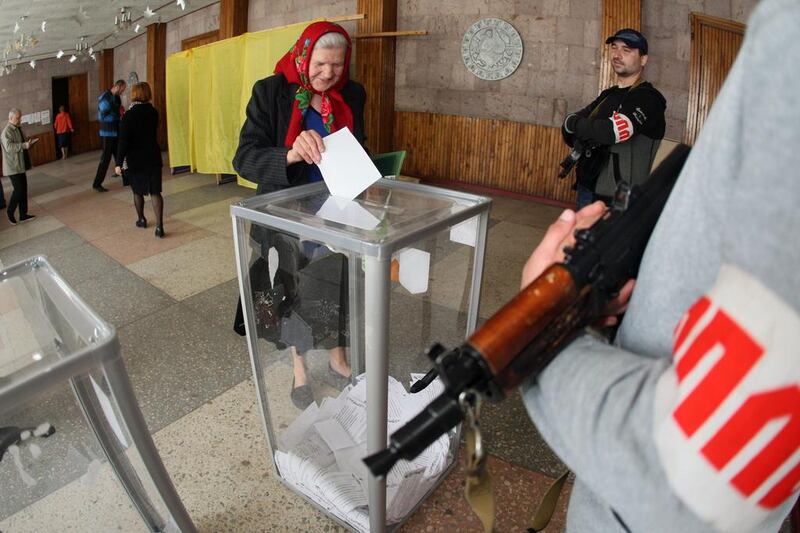Kiev // Residents in two Ukrainian regions voted in referendums on autonomy on Sunday as European leaders threatened more sanctions for Russian president Vladimir Putin unless he assuaged the crisis before a May 25 presidential vote.
The ballots in the eastern Donetsk and Luhansk regions on whether to declare independence from Ukraine defy a call from Mr Putin to postpone them.
The vote also drew condemnation from the United States, the European Union and the government in Kiev, who say that they are illegal.
Ukraine’s government killed “many” rebels holding buildings and roads in eastern cities, acting president Oleksandr Turchynov’s top aide said yesterday, adding that separatists lacked sufficient control for a legitimate vote.
“We do not recognise the referendums,” Ukrainian presidential chief of staff Serhiy Pashynskyi said in Kiev. “In two thirds of Donetsk and Luhansk, there is no referendum at all. It is not a vote, it’s a poor attempt by terrorists, criminals and killers to hide their actions.”
In their worst stand-off with Russia since the fall of the Iron Curtain, the US and EU states accuse Mr Putin of trying to destabilise Ukraine in a push to increase his sway in territories that once comprised the Soviet Union.
The EU said it might announce new sanctions as soon as Monday on Russian companies that seized assets after Mr Putin annexed Crimea in March, while the US threatened “deeper costs”.
Unity support
The referendums underscore a divide between a minority community identifying with Russian heritage and other Ukrainians who want the country to stay whole and strengthen its ties with the more developed EU.
Separatist election officials said turnout was 69 per cent in Donetsk and 80 per cent in Luhansk, conflicting with reports by eyewitnesses and local media that participation was lukewarm and many polling stations did not open. The votes’ organisers do not have access to the official electoral register or other voting infrastructure.
“I voted today because we must decide ourselves what to do here and how to live,” said Peter Bobrovsky, an unemployed man.
A study, meanwhile, by the Pew Research Centre found that 70 per cent of respondents in eastern Ukraine, where Russian is widely spoken, wanted the country to remain unified and keep its current borders. In the west of Ukraine, it was 93 per cent, the poll of 1,659 people conducted from April 5 to April 23 showed. It gave no margin of error.
* Bloomberg News





